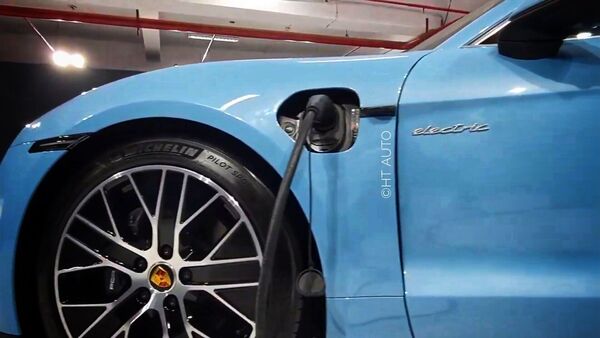Union Budget 2022-23 is expected to share several initiatives from the Centre to step up EV infrastructure in India with a focus on local manufacturing. At a time when import duties on electric cars has triggered a debate, with luxury EV makers voicing support, the focus is on Finance Minister Nirmala Sitharaman to see if any tax relief is coming for the big brands producing electric cars.
2021 saw as many as eight luxury electric cars launched in India, the most in a year so far.
Audi led the pack of luxury carmakers in India with launch of five electric models. BMW and Jaguar Land Rover also launched their first EV models as well. Among super luxury brands, Porsche too has joined the EV race with the launch of Taycan EV last year. Lamborghini too is waiting on the sidelines for the right time to launch its first electric car in India.
Speaking to journalists recently, Sharad Aggarwal, Head of Lamborghini India, said, “Lamborghini has announced roadmap for electrification for future and the second half of this decade we will have fully the electric Lamborghini coming to the market.”
Francesco Scardaoni, APAC Head, Automobili Lamborghini, said, “What we are learning from new EV car companies not only in India but China and the rest of the world is that EV will have different customers and customer needs are really different.”
Aggarwal echoed other EV makers on the point that there is a need to reduce import duties to make EV business in India more viable for super luxury brands like Lamborghini.
He said, “It’s the right view because it is also a journey which we are starting now in India. We see a very positive response in the premium segment from the models launched recently. This positive step from the government can help us move into the sustainable future at a faster pace. Because this also not only requires bringing electric models to the market but also building the electric infrastructure with the charging facilities and we need a certain basic minimum volume to start covering the right network of charging stations so the customers can feel comfortable when they are driving their electric cars on the roads.”
Local manufacturing is another aspect the luxury EV makers are focusing on, besides the reduction in import duties. Mercedes-Benz, which leads the luxury segment in India, is all set to drive in the EQS this year and will manufacture it locally. Martin Schwenk, Managing Director and CEO at Mercedes-Benz India, said, ““It has been highlighting the need to rationalise the import duty structure for EVs and other high-tech cars like the AMG range to achieve cost parities with the ICEs for the consumers and trigger a faster adoption among luxury EV users. It will be difficult to grow the EV penetration with such high import duty structure which continues to be barrier of the segment growing.”
Similar views were echoed by Balbir Singh Dhillon, Head of Audi India, when he said, “The auto industry as a whole needs the support of the Government to get back on track and we hope that Budget 2022 will address the concerns of the auto industry.
Burdened under high duties, GST, Cess and registration costs, we urge the Government to rationalise the entire tax structure, which eventually will lead to higher volumes for the industry.”
This year, luxury car brands are expected to launch more models. Besides the Mercedes EQS, India is likely to see the launch of Audi Q4 e-tron, BMW i4 and Volvo XC40 Recharge among others.
Source: auto.hindustantimes.com









